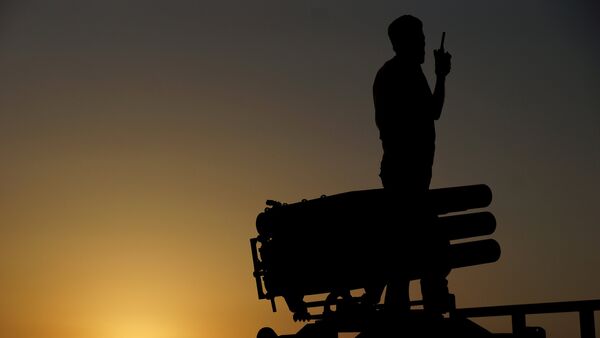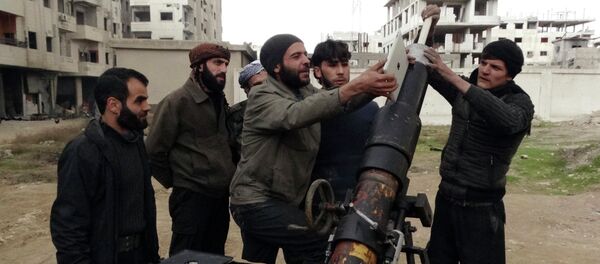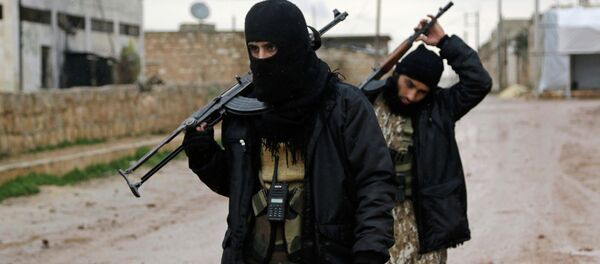The geopolitical analyst admitted that the so-called moderate Syrian rebels have been "effectively compelled to enter into a devil's bargain with the radical Islamists in order to have any chance of accomplishing their overriding goal, [eliminating Assad from power]," but felt that supporting such militants was, nevertheless, apparently justified.
"Those who did not make this calculation are by now either dead, have withdrawn from the battlefield, or are hoping they will not be killed as a result of the indecisive geopolitical calculations of their American patrons," he notes.
Commenting on the Russian campaign of airstrikes in support of the internationally recognized government of Syria, Buonomo acknowledges that "Russian military operations have" only further "raised the risks of US involvement in Syria."
"Taking these risks [Russian intervention] into consideration, the Obama administration should increase its military aid to the moderate rebel factions in order to pressure Putin to jettison Assad," the analyst notes.
Effectively, Buonomo seems to suggest that Washington should expand its aid to people who not only have no hope of seizing power, but who are, in his own words, likely to be overrun and destroyed by radicals at the first opportunity. If Obama were to follow his advice, this would mean not only further prolonging Syria's agony, but could very possibly mean an outcome where the 'winners' are jihadists.
And what is his justification for such a policy?
In Buonomo's words, "if the Obama administration does not [spend more money arming the rebels] it will find itself watching haplessly as the US' regional partners –Saudi Arabia, Turkey and Qatar…act unilaterally by supporting their own chosen factions, thereby exacerbating the sectarian dimension of the conflict. This will [in turn] reinforce the current dynamic that compels the moderates (from their perspective) to act in concert with the Islamist radicals."
The fact that Saudi Arabia, Turkey and Qatar have already unilaterally supported their own chosen factions (including the Nusra Front and ISIL) since the rise of ISIL regardless of what the US says or does (as angrily admitted by Vice President Biden over a year ago now) doesn't seem to give the analyst much cause for reflection.
Thus, his analysis suggests that instead of halting its efforts to overthrow the legitimate Syrian government, the US would be better off by supporting anti-Assad forces in the off-chance that once Assad is overthrown and all hell breaks loose, the moderates will have "a better chance," but no guarantee, of preventing Islamist militias overrunning the country completely.
The wider goal, apparently, is to make Russia and Iran's "decisions [to support Assad] costly enough that they will sooner rather than later decide that the wiser course of action would be to nudge Assad out of power or orchestrate a coup." How exactly Moscow, and moreover, Tehran, whose direct national security interests depend on defeating Sunni extremism in the region, might be persuaded to abandon a regime preventing radicalism from spilling over its borders, remains unknown.
Finally, and most dangerously of all, Buonomo suggests that while the US should "take precautions to prevent the downing of Russian aircraft," at the same time, the White House "should assist with targeting of Assad's rotary- and fixed-wing aircraft," ostensibly "in order to help drain his and Russia's finances and demoralize his ground forces."
Ultimately, Buonomo's basic logic is flawed. Suggesting that Moscow and Tehran must realize the necessity of finding a viable "moderate" candidate to replace Assad in the interests "of stabilizing the Syrian state," the analyst doesn't seem to recognize that they've already found him – his name is Bashar Assad.
Buonomo's proposals seem to mirror the Obama administration's inability to acknowledge that US attempts at regime change in the region, from Iraq in 2003 to Libya in 2011 and now Syria, have led only to untold suffering in those countries, and to politically volatile refugee crises in others.






